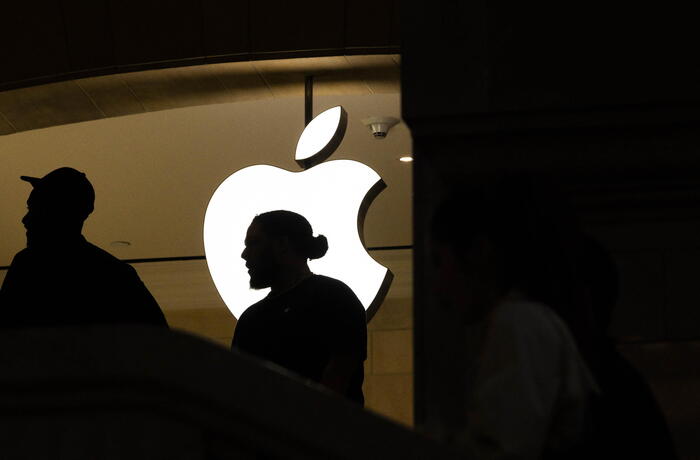A woman checks her smartphone. Oscar Wong (Getty Images)
Living without being exposed to any type of advertising would mean, nowadays, going to an isolated place, far from all civilization, so as not to suddenly see an advertising billboard when you go out for a walk and, of course, without the press, television, radio and internet.
But that's not the reality for most people: Back in 2007, the year the iPhone was taking its first steps, the average American urbanite was receiving about 5,000 ad hits a day, the market research firm estimated in a report. Yankelovich.
15 years later, with a large portion of the population constantly glued to an always-connected smartphone, that number is likely to be much higher.
More information
Google checks the location and 'online' activity of Spaniards 426 times a day
Advertising is so present in our lives that we hardly see it anymore, although it tries to attract our attention by being more and more personalized and relevant.
No one is surprised that shortly after doing a search for anything, related ads appear on the websites and apps you visit.
But, how does this tracking take place? Why does Instagram know on my mobile that shortly before I did a search for recipes in the computer browser?
"Devices usually collect information to improve the user experience (or so they call it), to personalize ads, share that information with third parties and even to mine data," explains Sara Nieves Matheu, postdoctoral researcher in cybersecurity at the University of Murcia .
This information, the expert points out, is collected "in a very simple way" through the requests that our browser makes every time we visit a website, through cookies, web
beacons
("pixels that are loaded with the web without you noticing"), by logging into a website with third parties (Google or Facebook) or through fingerprint analysis.
The latter, the digital footprint, is made up of information such as the operating system we use, the language in which we have it configured or the time in which we double-click, factors that indicate how unique we are in our online behavior.
In other words, every time we browse the internet or walk around with a smartphone in our pocket, depending on the privacy settings we have on browsers and devices, we generate a lot of information that allows us to create a profile about who we are or identify ourselves.
Who collects that information, with whom it is shared and how it is used is part of those things that we access each time we click “accept” the cookie policies, privacy policies or terms of use.
Let's take as an example a search that leads to an ad in a social network application.
Roberto González, Senior Researcher and Data Scientist at NEC Labs Europe, explains that in this case, one of two things is possibly going on.
First, it could be that the ad is served by the same company that owns the search engine (or by a subsidiary).
"In this way and by the
advertising ID
[a unique identifier for each user that mobile devices have] or because you are logged in, they know what user you are and they can send you an ad related to the previous search," he says.
The other situation is a data synchronization process behind: "The company that owns the search engine has communicated the user's data with the
advertising ID
XXXXXX to a data platform, and those have in turn communicated it to the company that bids on the ad”, he explains.
In other words, it is clear that the data that we generate with our activity is processed and shared by the different companies involved in the world of online advertising, but the ecosystem is so complex that taking it for granted that Alphabet, owner of Google, offers you data to Meta, owner of Instagram, would be inaccurate.
“The ads that are displayed in an application are not normally 'served' by the application itself, but use a
framework
, a framework, that serves them (I assume that applications from large companies will have their own service to display the ads) .
Come on, the normal thing is that the company that owns the
app
only inserts a code so that ads are placed and that it has no control over them, ”says González.
On other occasions, hyper-personalized ads coincide with something that we have only said and not searched for, so it can give us the feeling that the devices are listening to us.
Pierre Bourdin, professor at the UOC's Informatics, Multimedia and Telecommunications Studies, indicates that it depends on how we have configured the mobile, but he is clear that if we use Google or Amazon services, they do listen to us.
“You have given them permission,” he assures.
The issue is what they do with what they hear, if they really use it to put you ads.
Roberto González thinks not.
“Most likely, the ads reach us because we talk about things that interest us or the people we are talking to and because of geolocation, or because we are friends on a social network, they can show us the ads that interest our customers. friends",
take back control
Despite all this hyper-personalization of
online
advertising , the ads we see are not always right.
In a survey conducted earlier this year by ParcelLab, 49% of respondents said they had been shown the wrong ads for their profile.
Instagram thinks I'm the right audience to advertise PRIVATE JETS.
pic.twitter.com/tSQJwmKs74
– Agus (@agustinannn) January 19, 2022
Those weird ads we see sometimes that make us wonder who the algorithm thinks we are doesn't mean they don't know as much about us.
Pierre Bourdin explains that it's possibly all part of how algorithms work.
“One of the problems with algorithms is that they have a tendency to reduce their field and the topics to get right, but that means that other aspects that might interest you are lost.
To avoid this, they jump to another random theme to try, to see what your reaction is.
If you are interested, that parameter is added to the profile”, he indicates, although he points out that it is very difficult to know how they work, in particular the algorithms that decide what advertising we see, since they are very opaque and secret.
For his part, Roberto González adds that in general advertising campaigns "are not designed to maximize how appropriate the ads are for the user, but to maximize profit."
In other words, even if we know that a user is much more likely to click on one ad than another, if one of the companies pays more per click, it will be more profitable to display their ads.
The private
jet
company is likely to pay much more than a small clothing brand.
These advertising failures, therefore, do not necessarily mean that companies do not really know who we are and that we should lower our guard.
“We must stop playing down the matter, thinking that it doesn't matter if they spy on us, that we are not interesting, that our information does not matter,” says Sara Nieves Matheu.
“Companies create our profiles based on what we search for on the web, our habits, our purchases.
They know our gender, age, if we are single or married, if we have children or pets, our tastes... they know us better than our own family.
In this way they personalize the ads they show us so that we buy more, but they also obtain very relevant information for some services.
Your medical history is very useful for a health insurer,
The expert mentions
Privacy-Enhancing Technologies
(PET) or privacy-enhancing technologies as an easy way to minimize such tracking: set our browser to block tracking by fingerprint or
cookies
, use ad blockers, use popular settings to help prevent us from being identified by our fingerprint (“Firefox and the use of American English are two of the most common configurations”), etc.
Other more elaborate options are “the use of
proxies
or VPN or, the best option, the use of anonymous browsing tools such as Tor or JonDo”.
However, everything has its counterpart.
"The fact that using these tools slows down browsing and the little importance we give to our privacy makes us prefer not to use them," he says.
“I would like users to have greater control over their data and to be able to decide how it is used”, reflects Roberto González.
From NEC Labs Europe, the research firm where he works, they have been "working on a project together with several European universities and companies for some time to develop technology that allows the appearance of PIMS (
Personal Information Management Systems
or information management systems). staff)".
In fact, they have just launched a data platform in which users can "decide what data they want to share and with whom they want to share it, and in return they can receive rewards."
Finally, Pierre Bourdin highlights the importance of legislation to protect us.
Although users can exert some pressure on technology, in the end they have a lot of power over our lives.
“Even if you are an expert, it is almost impossible, for example, to have an Android phone without Google or an iPhone without Apple.
We have a choice between who to give the data to.
There are
freephones
, yes, but very few people have one”, he points out.
But there is some hope.
A mixture of public awareness and increasingly strict data protection legislation has led Google to announce that in 2023 it will eliminate third-party cookies, one of the bases of personalized advertising, from Chrome.
Apple has also incorporated tools that give more power to the user.
However, there is still a long way to go.
You can follow
EL PAÍS TECNOLOGÍA
on
and
or sign up here to receive our
weekly newsletter
.



/cloudfront-eu-central-1.images.arcpublishing.com/prisa/6PCYWBT5HNGIBCP74GX6LHK74Y.jpg)











